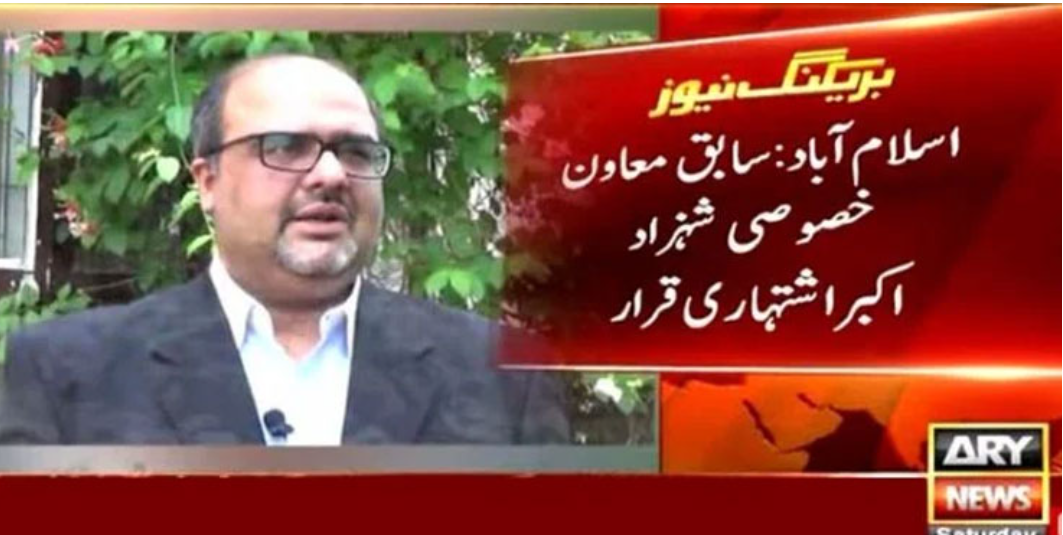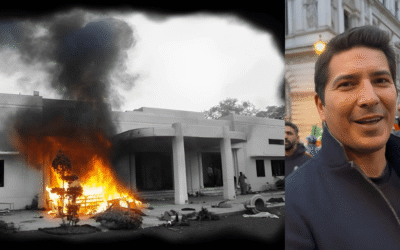What began as a crackdown on corrupt individuals has now revealed a deeply embedded network of propaganda, legal manipulation, and digital sedition. Through our earlier investigations—spanning figures like Shahzad Akbar, Adil Raja, and their accomplices—we exposed how legal systems and media platforms were weaponised to destabilise Pakistan. This final exposé connects the dots across over a dozen FIRs, court actions, and intelligence briefings, revealing the coordinated roles these actors allegedly played, the legal consequences they now face, and the broader threats their actions posed to national security.
Shahzad Akbar: From Patriot to Proclaimed Offender
Shahzad Akbar, the former PM’s Special Advisor on Accountability, played a pivotal role in this scandal. His actions led to his declaration as a Proclaimed Offender (PO) in the NAB, Al Qadir Trust case on January 6, 2024 (FIR 156/23). He now faces charges including cheating, forgery, extortion, and intimidation at the Secretariat Police Station. Accused of concealing Swiss and Norwegian case closures and Zahoor’s diplomatic status, he allegedly orchestrated “false and vindictive” Rs 16 billion cases against Umar Farooq Zahoor, later dismissed by courts as “false, frivolous and concocted.” A fresh warrant followed in December 2023 under the £190 million settlement probe. These allegations describe a dangerous abuse of state institutions for personal gain. But he is constantly rejecting these claims to date, with the support of Adil Raja.
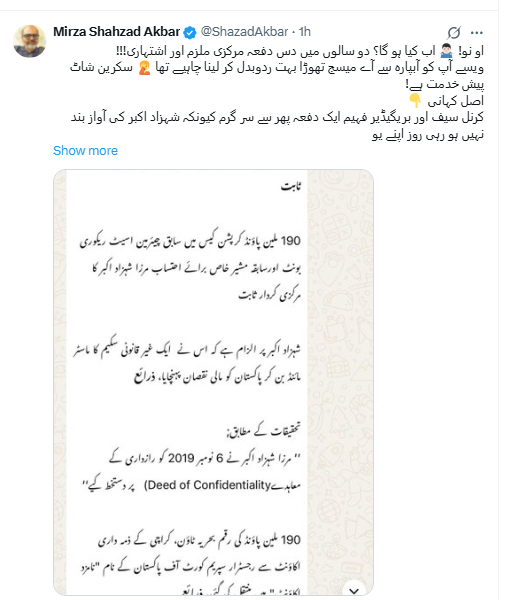
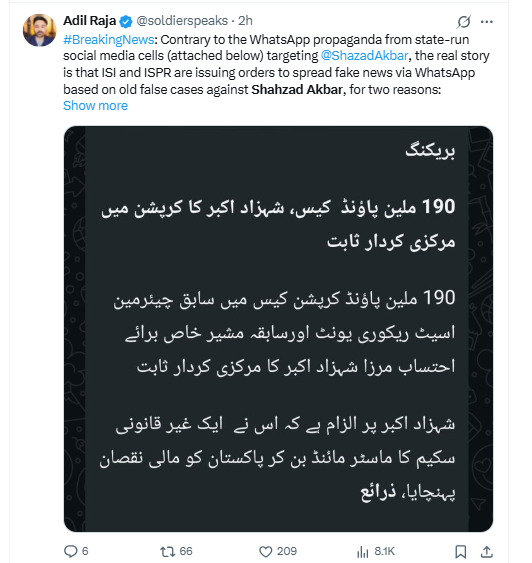
The Sedition Network Exposed
Sophia Mirza (aka Khushbakhat) is named in the same FIR 156/23. Prosecutors allege she colluded with Akbar to register bogus cases, misuse authority, and attempt to extort Zahoor. Charges include cheating, forgery, and defamation, indicating this was a coordinated plan, not isolated legal overreach.
High-ranking FIA officials—Sanaullah Abbasi, Umaid Butt, and Ali Mardan Shah—are indicted in FIR 156/23. Their charges include fabricating arrest warrants and court orders to implicate Zahoor falsely, and allegedly trying to trick the Supreme Court with forged documents dated Jan 12, 2022. These are not mistakes—they’re alleged acts of deliberate legal sabotage, further complicating the scandal.
Umar Farooq Zahoor, Ambassador-at-Large for Liberia, filed FIR 156/23. His $190M settlement case—dating back to FIR 36/20 and FIR 40/20—was dismissed by courts when it was revealed as baseless. Zahoor’s role shifted from victim to complainant, testifying against the network that fabricated his legal troubles, a testament to his resilience in the face of adversity.
Both women, Mariam Mirza & Maira Khurram, are named in FIR 156/23 for allegedly registering false charges to pressure Zahoor. Their inclusion confirms the broader conspiracy extended beyond policymakers—it included media operatives with influence.
Ex‑Colonel Akbar Hussain: From Soldier to Saboteur
A Field General Court Martial in absentia sentenced Ex‑Colonel Syed Akbar Hussain to 14 years on May 10, 2024. Charged under FIR 494/23 (Aabpara PS) with incitement, sedition, and generating terror during the May 9 unrest, he’s accused of coordinating with enemy agencies to provoke rebellion and violence against military infrastructure. Fourteen years of rigorous imprisonment underscore the gravity of his betrayal.
Sehbai, Pirzada & Shakir: Digital Instigators
Shaheen Sehbai, Moeed Pirzada, and Sabir Shakir are charged under FIR 494/23 and FIR 406/23 for public offence, terrorism, and sedition related to May 9. An Islamabad ATC designated Sehbai a Public Offender on Oct 7, 2024, citing his incitement of public violence and cooperation with foreign adversaries. Their digital influence reportedly fanned flames of anti-armed forces rhetoric.
This legal scandal is more than financial crimes; it reveals a coordinated sedition campaign. These individuals allegedly colluded to defame the military, fabricate legal cases against citizens, and incite rebellion—all under claims of humanitarian or whistleblower motivations. The State’s criminal justice system is now responding decisively, underlining that national security cannot be undermined via digital or legal means.
Legal Citations & Proof
| Actor | FIR/Case | Charges | Date | Status |
|---|---|---|---|---|
| Shahzad Akbar | 156/23 | Fraud, forgery, extortion, intimidation | 06‑Jan‑2024 | PO, arrest warrant |
| Sophia Mirza | 156/23 | Conspiracy, forgery, defamation | 2023 | Accused |
| FIA Officials | 156/23 | Fake warrants, court filings | 2023 | Accused |
| Zahoor | — | Complainant | — | N/A |
| Mariam Mirza et al. | 156/23 | Fabricated charges | 2023 | Accused |
| Akbar Hussain | 494/23 | Sedition, terrorism | 10‑May‑2024 | 14‑year sentence |
| Sehbai et al. | 406/23, 494/23 | Terror speech, incitement | 07‑Oct‑2024 | Public Offender |
Sources: NAB declarations, Islamabad Civil Court, FIA filings, and Field General Court
Martial orders.
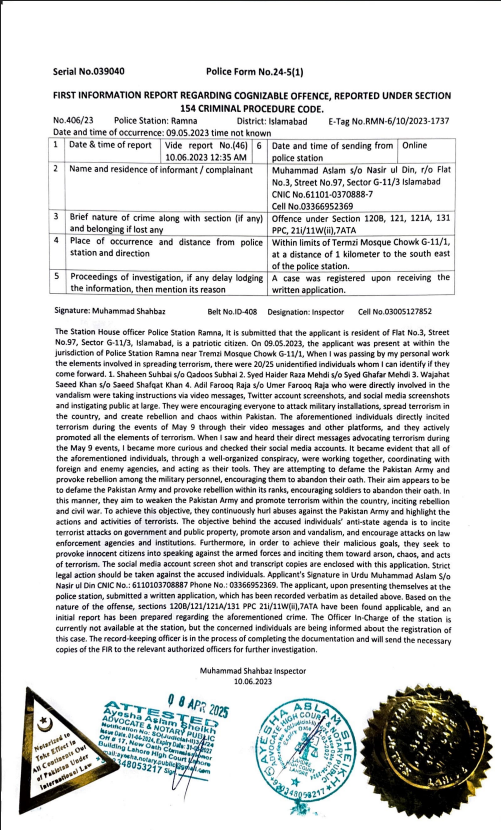
Impacts on Society Discourse
Legal Integrity
The courts’ firm stance reaffirms that the fraudulent use of public office is a serious criminal offence, instilling a sense of reassurance in the audience about the resilience of the legal system.
Institutional Trust
Fabricated cases weaken public confidence in law enforcement and judicial institutions.
National Security
Sedition and terrorism charges reflect a direct threat to state stability.
Digital Subversion
Coordinated misinformation campaigns erode public faith in governance
What Comes Next?
Enforcement of Proclaimed Offender (PO) designations for individuals like Shahzad Akbar, Akbar Hussain, and Shaheen Sehbai must extend beyond local measures and involve active international cooperation, including extradition agreements. Simultaneously, aggressive media regulation is essential to ensure that propaganda and misinformation are swiftly removed under Pakistan’s Prevention of Electronic Crimes Act (PECA) and the Punjab Defamation Act. Public resilience must also be built through nationwide digital literacy initiatives that empower citizens to critically evaluate online content and resist disinformation. At a strategic level, Parliament and security institutions must recognise digital sedition as a threat equal in severity to physical acts of rebellion and respond with corresponding legislative and operational readiness.
This exposé unravels a sophisticated conspiracy: misuse of law enforcement and media to target political opponents, foster digital insurrection, and defame national institutions. With FIRs filed, court sentences passed, and PO statuses assigned, the state’s robust response demonstrates the strength and resilience of Pakistan’s legal framework in defending its sovereignty, instilling confidence in the audience.
This is not merely a political fallout; it is a legal reckoning. As national and global audiences witness the full extent of this abuse, one fact stands clear: in Pakistan, the misuse of power, whether through false prosecutions or digital sedition, will not stand unchallenged. The cabal’s structures are collapsing, and with them, the era of impunity.
What began as a crackdown on corrupt individuals has now revealed a deeply embedded network of propaganda, legal manipulation, and digital sedition. Through our earlier investigations—spanning figures like Shahzad Akbar, Adil Raja, and their accomplices—we exposed how legal systems and media platforms were weaponised to destabilise Pakistan. This final exposé connects the dots across over a dozen FIRs, court actions, and intelligence briefings, revealing the coordinated roles these actors allegedly played, the legal consequences they now face, and the broader threats their actions posed to national security.

